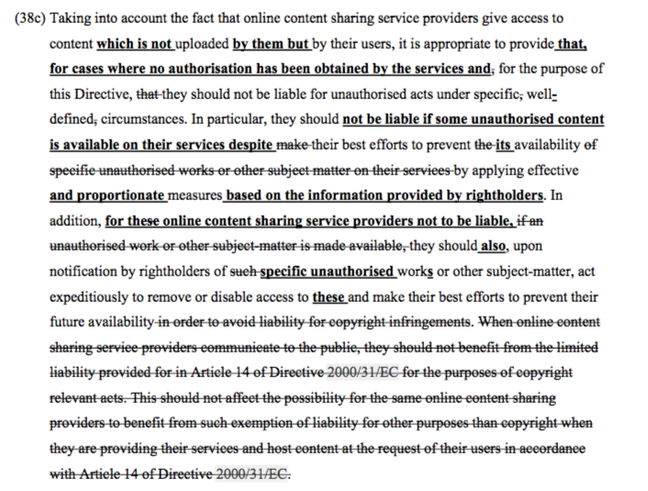This article is more than 1 year old
Under-fire Silicon Valley to gain new copyright 'safe harbour' in EU, fume critics
Language tweak makes internet giants safer than ever, say rights groups
Exclusive The European Union looks poised to strengthen large internet platforms' position against online liabilities, according to a leak of the latest copyright directive draft dated 23 April. The most recent publicly available draft (PDF) is dated 13 April.
Critics say proposed amendments in European law would grant new "safe harbour" provisions that are favourable to the giant firms – meaning the tech goliaths can continue banking loads of cash and avoid punishment while their websites and services are used to rip off copyrighted work.
Ironically, the new legal privileges come out of a well-meaning effort to help the music industry fight YouTube by plugging what the business calls a "value gap".
This is part of the European Commission's Digital Single Market initiative, which compels copyright industries to harmonise exceptions and limitations, and introduces content portability.
In return, the commission was sympathetic to the demands of two groups: newspaper publishers, which asked for tighter control over excerpts of material, and the music industry, which argued that Google distorted the market price for music because it enjoyed an advantage thanks to user-generated content (UGC), something rival services Apple and Spotify do not have.
The industry argued this created a "value gap". In its 2018 Global Music Report (PDF), Trade group IFPI used public data to estimate that Spotify generated 28 times as much revenue per user as YouTube* in 2017. We explained it the value gap by analogy here.
"The film industry has been very sceptical about the value gap and all the things they were worried about turned out to be justified," one legal expert familiar with the process told us.
Privately, TV and broadcasters – and some music groups – have urged the commission to revise the language of the measures intended to address the value gap, which they argue only makes Google's position stronger.
Closing the gap
To address the gap, the Commission set about tweaking EU copyright law. It sounded simple enough on paper. Services such as Spotify and Apple Music must negotiate and pay for rights up front.
YouTube would be obliged to use the content ID tools it already has to make the UGC takedown process more efficient. Because of its selective use of ID filtering, the cost of policing infringement falls heavily on the rights-holder, and on the small rights-holder even more so. So the commission decided that platforms would be obliged to make use of readily available ID technology to ensure the material is not continually uploaded – "takedowns would become stay-downs" in the lobbying language.
This, it was hoped, would level the playing field between Europe's broadcasters and film-makers and Google's owner, Alphabet. The YouTube parent, however, is in a stronger negotiating position as it can rely on users continually uploading copies of the same material to its servers.
But the broad sweep ensnared other services. Silicon Valley won itself some new rights. And these rights, copyright industries now argue, are more generous than they were before the process started.
The proposals have been tossed about the Council of Europe in which member states negotiate, with the latest draft, which we have seen, emerging last week.
Appropriate rewards
Recital 38 specifies an "appropriate reward" – something the market typically decides.
The value gap tweaks are incorporated into Article 13 of the Copyright Directive, and two accompanying Recitals, 37 and 38. The E-Commerce Directive, some argue, would be the natural place to discuss platform liabilities, as it would address concerns broader than copyright – about trafficking and terrorist material, for example – but The Register has been told there's a reluctance to "open Pandora's Box". So the new Copyright Directive retains the E-Commerce Directive's Article 14 safe harbour for data-processors and "information society services" for all purposes but copyright, and redefines a safe harbour rule for copyright.
The directive addresses the liabilities of what it calls "online content sharing service providers" (OCSSPs), ie, those that "[store] and [give] access to a large amount of copyright-protected content". Their status must be qualified on a case-by-case basis (depending on what it is decided is their primary purpose). To make up for the loss of safe harbour under Article 14 of the E-commerce Directive, member states must provide a new safe harbour for OCSSPs, which is what the drafts are attempting to do.
There are huge carve-outs for cyber lockers and "encyclopaedias", excluding serial copyright infringers like Wikipedia, and "online marketplaces". Size counts, too, with carve-outs for SMEs.
The current draft affirms that it does not "change the concept of communication to the public or of making available to the public", but that Article 14's limited liabilities for copyright (only) should not apply. This is where if the site or service doesn't know, it can't be liable.
The "communication to the public" is important because it is considered the basis of an infringement. YouTube has maintained it's not communicating, but that became less supportable as it became the world's de facto jukebox, and struck deals with rights-holders a decade ago.
Under the latest draft Article 13(4), the "new safe harbour" applies when the OCSSP:
- "demonstrates that is has made best efforts to prevent the availability of specific works or other subject matter by implementing effective and proportionate measures, in accordance with paragraph 5, to prevent the availability on its services of the specific works or other subject matter identified by rightholders and for which the rightholders have provided the service it with information for the application of these measures" and;
- "upon notification by rightholders of works or other subject matter, it has acted expeditiously to remove or disable access to these works or other subject matter and it demonstrates that it has made its best efforts to prevent their future availability through the measures referred to in point (a)."
Make your "best effort"?
Critics are alarmed that "demonstrates" is weaker than the "proves" that it replaces. Several declined to comment publicly as the Council of Europe continues to work on the draft ahead of a June vote, but one who did said:
The OCSSPS were up in arms [that] it [was] too much and managed to convince enough member states they need to be moved out of one safe harbour and put in another.
Now all the other rights-holders are looking at this and asking "What's in this for us?" Most rights-holders don't work with blanket licences anyway because that's not how they distribute their content.
In a public letter dated 13 April, the group Creativity Works! – which represents organisations as diverse as the European Writers Council, indie music trade group IMPALA, the commercial TV body ACT, and the Premier League – argued that changes made by the Bulgarian presidency strengthen the position of internet platforms in Europe, and "further strengthen the role of some already powerful content sharing platforms. It would limit existing rights and create a special copyright liability privilege for these platforms".
Creativity Works! maintained that the proposed Article 13(4) would create a new special limited liability regime for OCSSPs by freeing them from burdens after a "best effort" block. Currently YouTube is required to go further and deal with identified works, or lose its safe harbour protections.
"CW! believes that it cannot be the intention of the European co-legislators to adopt legislation that would affect the marketplace in favour of certain online platforms at the expense of rights holders. We call on the Council to keep the scope of the important right of communication to the public fully intact," the group wrote.
Véronique Debrosses, general manager of authors' society GESAC, who also saw the leaked document, says rights-holders have won a partial victory with YouTube by taking the exception out of Article 14 (of the E-Commerce Directive) – but she questions why the burden of "proving" has become one of "demonstrating".
"We want to license, we don't want to block – creators like [to have] their content on YouTube. It's the main access [for the public] to [creative] works today. We want this so we can license on behalf of creators and negotiate a fair price," she told The Register.
Earlier concerns that a copyright filtering obligation would stifle business have been addressed by the Council, with several qualifications being added to earlier drafts that it should not apply to SMEs. Member states are directed that the measures must be effective but not onerous for the businesses to undertake.
GESAC has said it is concerned the Euro lawmakers may be influenced by "organisations more or less tightly linked to Google" – such as the new CreateRefresh.eu body, which is splashing cash on grants for creators who oppose Article 13.
"[Its] website speaks of the internet being the place where creators are seen, heard and inspired, but conveniently doesn't mention getting paid. Perhaps because the larger [user-uploaded content] platforms in fact don't or barely pay anything to creators, and that's exactly how they'd like to keep it," GESAC said recently. "The campaign offers a grant to creators for them to make content that actively advocates for diminishing their rights online. The irony is hopefully not lost on anyone."
While Silicon Valley giants are facing unprecedented regulatory attention, they haven't lost their knack for turning regulation to their profit. Google has used the introduction of GDPR data protection rules to grab ownership of publisher's metadata, the FT reported this week, by designating itself a controller of third-party data (more here). ®
*Bootnote
This is only partly accounted for by the UGC loophole: Google's preference for a free, advertising-supported model over subscriptions is also a factor. Google introduced a subscription version of YouTube, "Red", for a monthly fee of $10, but it has yet to launch in Europe. ®



